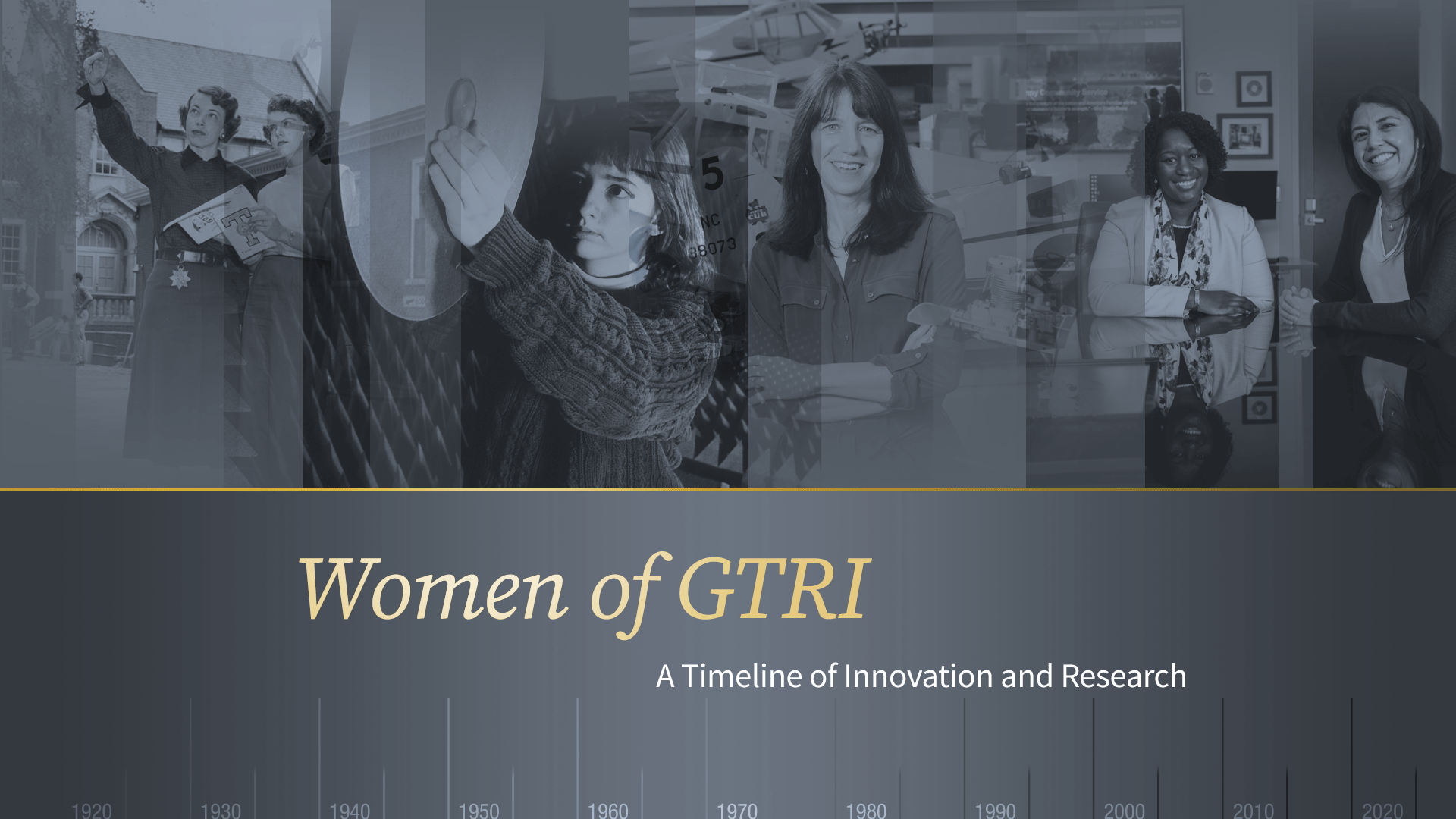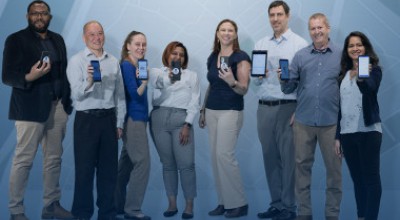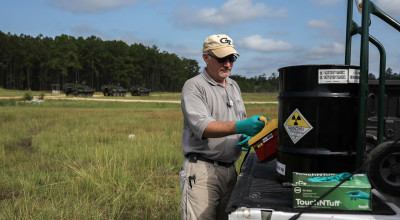Women across the Georgia Tech Research Institute (GTRI) have made incredible contributions in the world of research. From leading technological innovations to forging new career paths for future leaders, women of GTRI have shown that hard work and dedication to the betterment of human kind is more about understanding one’s purpose, no matter one’s gender. Since GTRI’s doors opened in 1934, women have successfully integrated their expertise across the organization, bringing a diverse and inclusive perspective to the forefront of research and technology.
Pioneering Expertise Impacting Research
When the Georgia Institute of Technology (Georgia Tech) welcomed its first female students, Elizabeth Herndon and Diane Michel, to campus in 1952, GTRI had just hit the $1 million mark of research awards, allowing the organization to meet its growing portfolio by investing in pioneering experts. More women joined the organization and moved into influential roles like Judi Komaki who worked in the Economic Development lab. Komaki was key in reinforcing the importance of GTRI’s technical assistance both domestically and in developing countries.
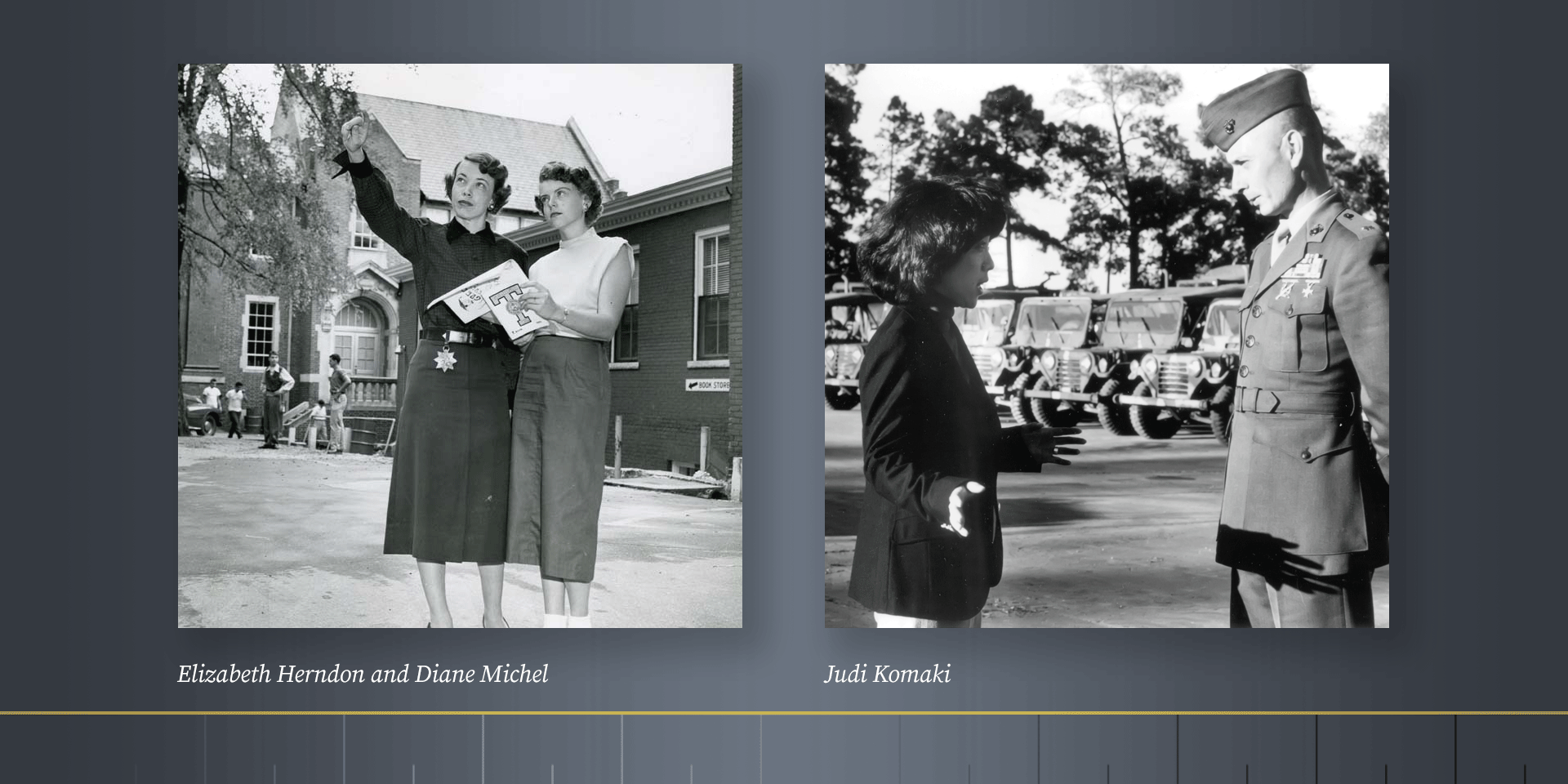
(Left photo) Elizabeth Herndon (left) and Diane Michel (right) were Georgia Tech's first two women students in 1952. Judi Komaki. (Right photo) discusses, with a battalion commander at Camp Lejeune, North Carolina, why vehicle maintenance is frequently neglected in 1981.
From 1970 to 1980, GTRI expanded its growth both physically – opening the doors of its Cobb County Research Facility in 1978 – and technically as developments in high-frequency radar progressed. In 1989, GTRI built what was at the time the world’s largest compact radar range for the U.S. Army at Fort Huachuca, Arizona. Women researchers like Amy Jacoby helped to test compact ranges that could measure radiation patterns of antennas as they occur over long distances and regardless of weather conditions.
By the late 1990s, the world was experiencing a shift toward sustainability. In 1998, Annie Pearce joined as a GTRI faculty research leader and eventually went on to lead the Sustainable Facilities and Infrastructure Branch – a research team devoted to promoting environmental sustainability through applied research, outreach, and education.
GTRI’s research competencies have expanded over the years, and by the early 2000s, GTRI was embarking on healthcare research, with one project specifically looking at improving the quality of life for the estimated 28 million Americans who are deaf or have a hearing impairment. Leanne West worked on a system that would allow users to receive, via an electronic display device, information that is audibly presented in a variety of public venues from movie theaters to transit stations
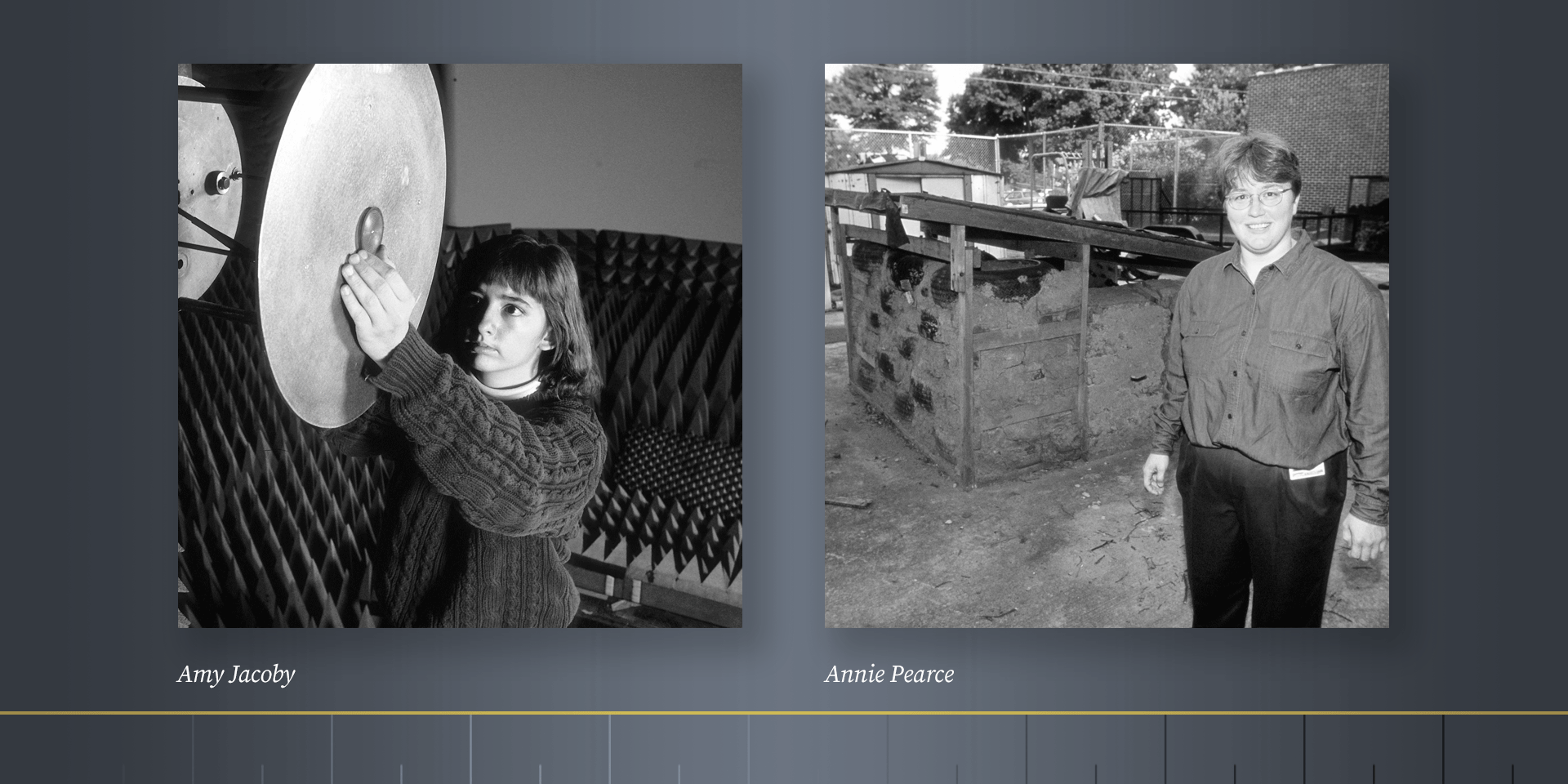
Left: Amy Jacoby places an experimental antenna onto a positioner for testing in GTRI's Compact Range in 1991. Right: Annie Pearce, specialist in investigating sustainable facilities and infrastructures, stands with her prototype of a sustainable building in 1998.
GTRI has long supported the efforts of the U.S. Department of Defense (DoD), ensuring the constant safety of our nation. The Integrated Defensive Avionics Software (IDAS) was developed by GTRI engineers to complement radar warning, missile warning and countermeasures systems – supporting rapid threat display and response.
Women at GTRI have always been pioneers – holding leadership positions, innovating new solutions, and exemplifying the Creating the Next mentality. Times change and standards evolve. Women account for 22 percent of the working population at GTRI with an increasing number of women holding senior leadership positions across units, laboratories, and the Director’s Office. Today, GTRI is immensely proud of the women working to solve complex problems to improve human well-being.
As we celebrate Women’s History Month, let’s take a look into how women across GTRI continue to impact the world of research.
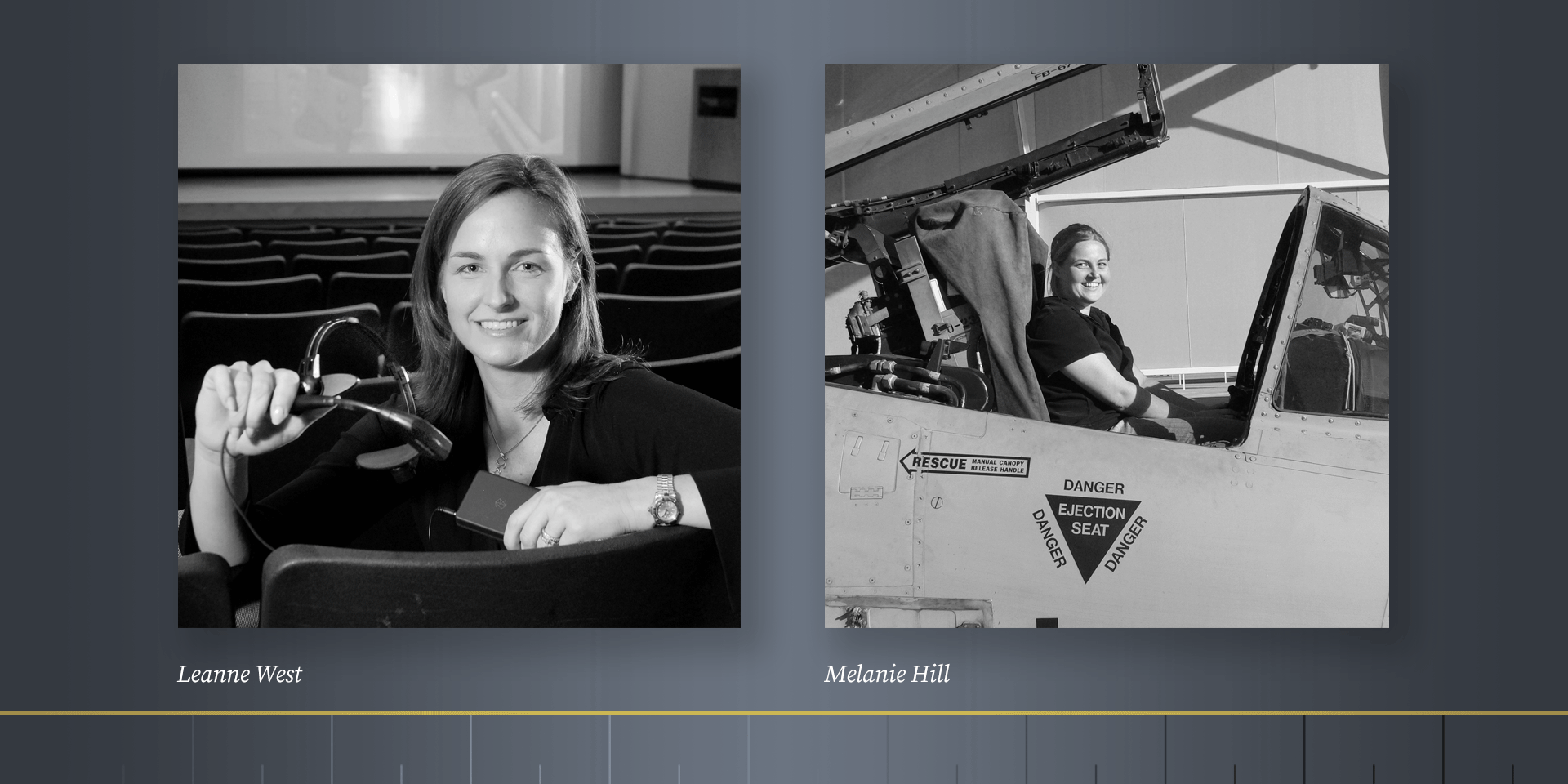
Left: Leanne West, senior GTRI research scientist, demonstrates the wireless captioning system in 2007. Right: Melanie Hill takes the controls during early testing of the A-10 Infrared Countermeasure solution in 2008.
Leading Research into the Future
Principal Research Scientist Jie Xu is working on a new method for removing phosphorus from food process wastewater using magnetic nanoparticles. Under GTRI’s Agriculture Technology Research Program, with funding from the State of Georgia, Xu and the GTRI team of researchers are using magnetized nanoparticles to attach to phosphorus. Then, both the particles and phosphorus are removed magnetically, after which both can be separated even further. This project could save poultry producers time and money in discharging cleaner water back in to the environment and potentially extracting valuable resources from the water. When asked about being a woman in research, Xu stated, “We are women, we are researchers. We are now. We are the future.”
GTRI specializes in modernizing systems for the DoD with over 90 percent of project work dedicated to supporting the nation’s armed forces. GTRI Senior Research Scientist Sheila Isbell and Senior Research Associate Margarita Gonzalez recently led an enterprise project to revamp the Army Community Service’s (ACS) systems used to provide social services to the families of soldiers. The ACS program focuses on providing an array of services for soldiers' families including supporting new parents, providing financial counseling, and helping in finding a job. Tasked with making the software smarter, faster, and user-friendly for long-term use, Isbell, Gonzalez, and the GTRI team built a cloud-based software suite with an open-source platform, allowing the Army to easily find contractors who are able to update or make changes to the system.
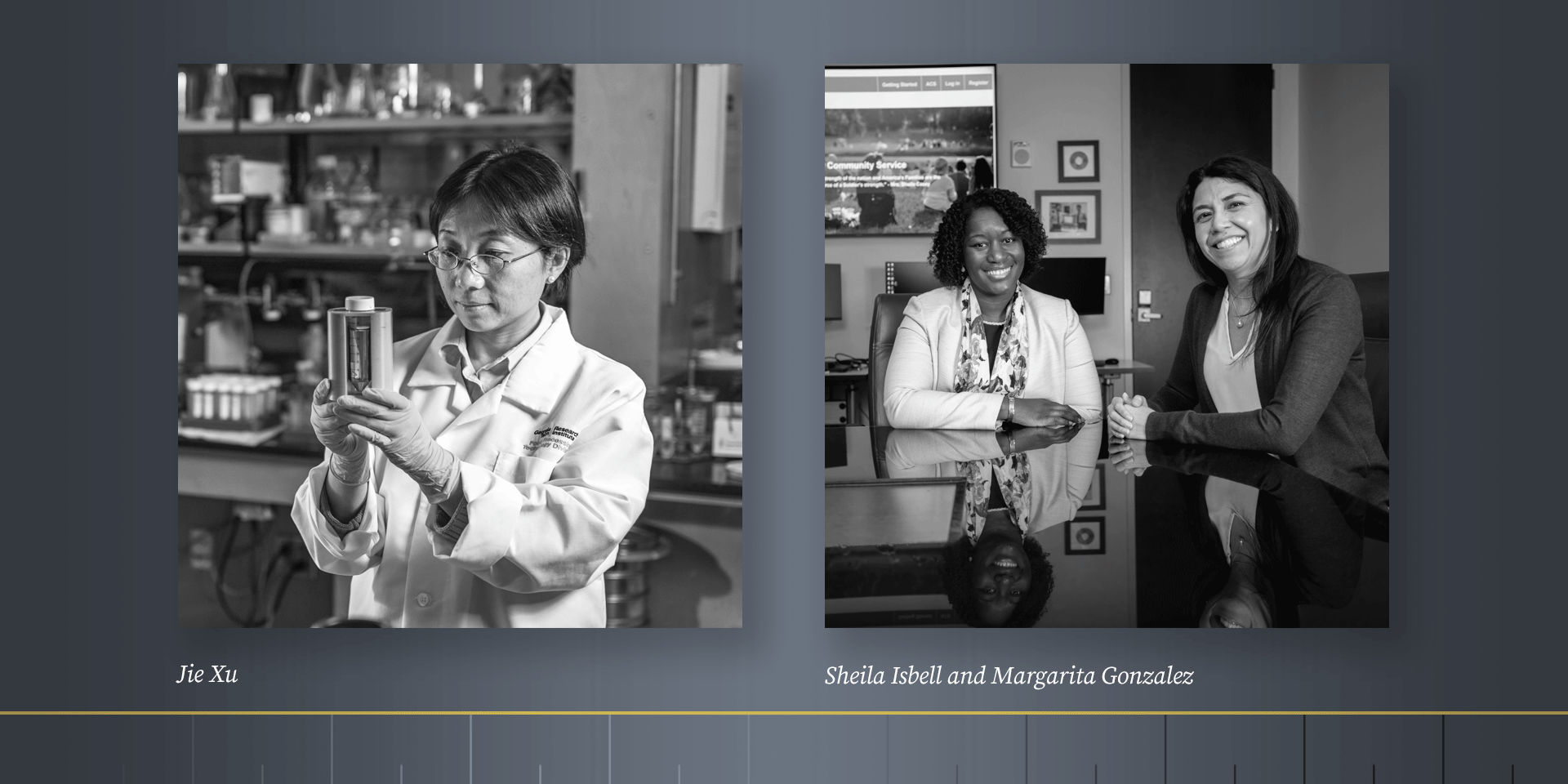
Left: GTRI Principal Research Scientist Jie Xu is working on a new method for removing phosphorus from food processing wastewater using magnetic nanoparticles. Right: GTRI Senior Research Scientist Sheila Isbell (left) and Senior Research Associate Margarita Gonzalez (right) are helping the Army Community Service program revamp information systems used to provide an array of social services to the families of soldiers.
Introducing Research Early to Inspire Leaders
The National Science Foundation reported that even though both computer science and engineering degrees have increased over the past two decades, they are still among the lowest shares of female degree recipients in the science and engineering field. That is why GTRI and women within the organization continue to be catalysts in inspiring young girls to explore STEM professions earlier in their lives.
Senior Research Engineer Sharaé Meredith is on the Board of Directors for I Am B.E.A.U.T.I.F.U.L. (IAB) – a non-profit organization dedicated to building self-esteem and leadership capabilities in girls and women of all ages. Through interactive learning experiences, the IAB team works to convey that females are Brave, Energetic, Assertive, Unique, Tenacious, Important, Fabulous, Unequaled, and Loved (B.E.A.U.T.I.F.U.L.). Meredith, who was the first African American woman to graduate from Penn State with a Ph.D. in Aerospace Engineering, coordinates the STEM activities and acts as a liaison between IAB and GTRI. Last year, IAB hosted an event at GTRI’s Centennial Research Building (CRB) where 33 girls from both Georgia and South Carolina participated in activities to explore astronautics and design thinking.
Meredith shares her thoughts about what it means to be a woman in research. “Being a woman in research, I am given the power of choice,” Meredith stated. “The gender ratio is to my advantage in providing me with a highly visible platform. It is up to me to decide what I will do with it.”
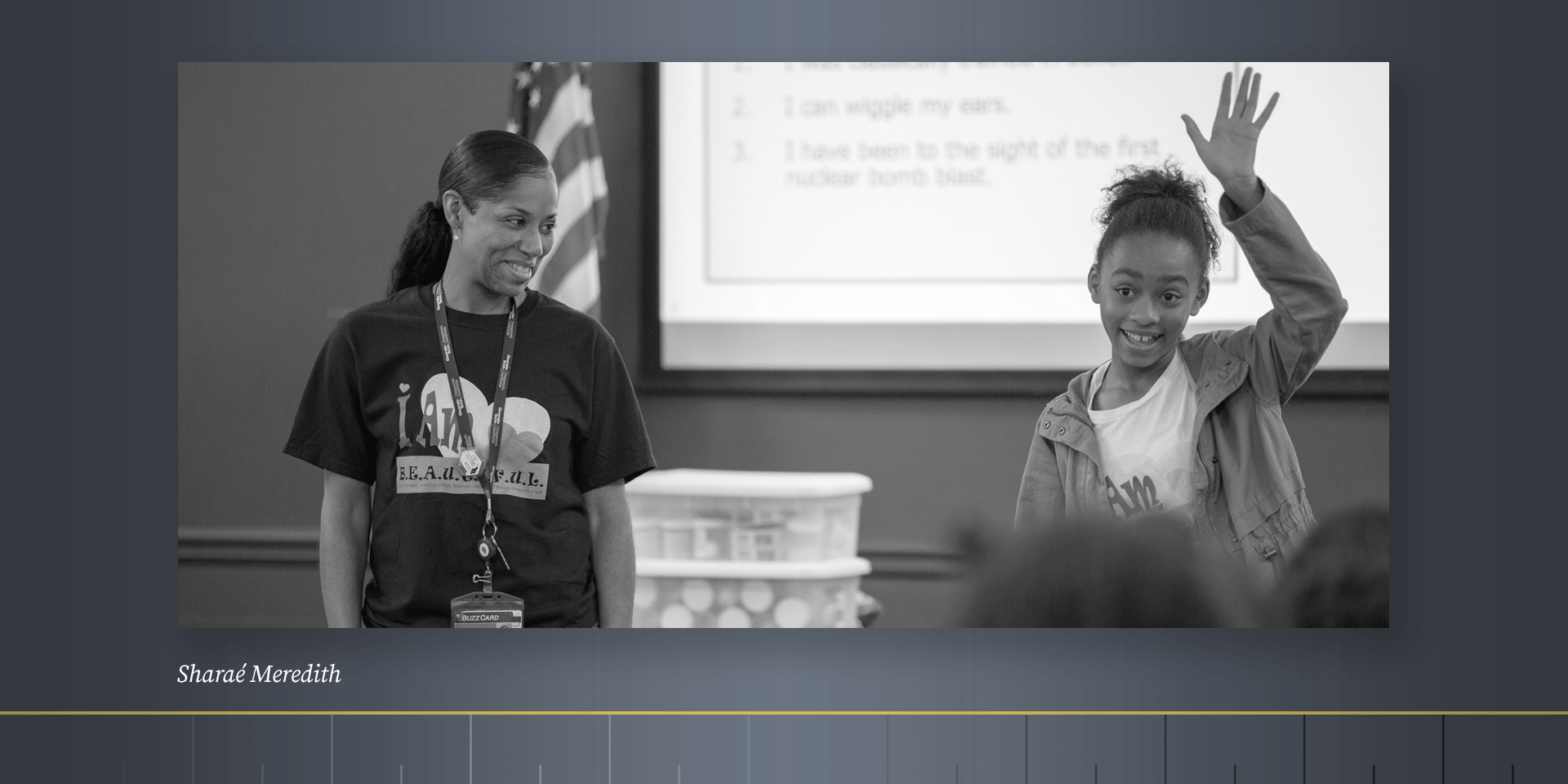
Senior Research Engineer Sharaé Meredith speaks to a group of girls at the I Am B.E.A.U.T.I.F.U.L. (IAB) STEM event hosted at Georgia Tech Research Institute.
Molding students from K-12 into the next STEM leaders of the world remains at the forefront of GTRI’s educational partnerships. Recently, Congressional App Competition winner Rumi Lee had no experience in coding prior to participating in the competition, but once she met with mentor and GTRI Researcher Brandon Hancock, Lee learned skills that allowed her to create a fully operating application. Outside of the new coding skills Lee acquired, she was also able to watch her hard work pay-off as she won a seat to the national competition in Washington D.C.
“The most fulfilling part was completing the app because it felt like a modern day masterpiece. You worked hard on it, it’s your blood, sweat, and tears. So many times there was an error in the code or a bug and it would just crash. So seeing it work and function, that was one of the most fulfilling moments for me,” Lee stated.
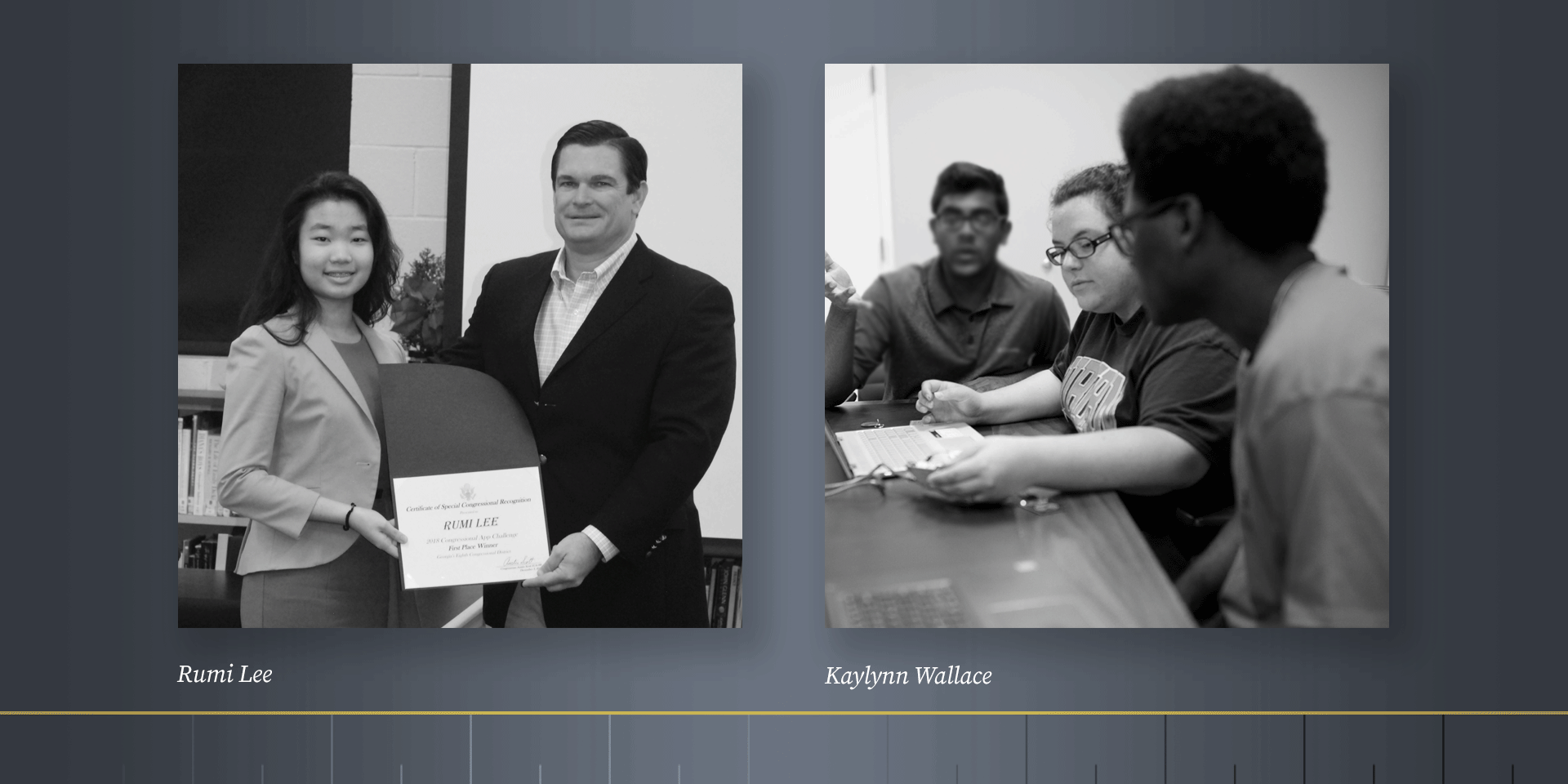
Left: Senior Rumi Lee pictured with Congressman Austin Scott as she receives her award for the annual Congressional App Challenge. Right: High School Graduate Kaylynn Wallace explores the life of an engineer during the 2018 STEM@GTRI Summer Intern program.
During the GTRI@STEM summer intern program – in partnership with the Technology Association of Georgia (TAG) – GTRI researchers participate in hands-on activities that exposes students to real world engineering experience. The unique STEM@GTRI program is designed to inspire, engage, and impact educators and students in STEM fields. Kaylynn Wallace, a graduate of Northside High School, participated in the 2018 summer program where she and three other students explored their interests in engineering by completing various project tasks. From ordering supplies, printing 3D mockups, and learning CSharp programming, students not only received career experience, but gained a mentoring network to help continue their journey through the industry. The program concluded with their Night Vision exhibit, which was the first “STEM Stop” project for the Museum of Aviation.
“It was definitely an eye-opening experience.” Wallace stated. “Not a lot of people know that GTRI is here, but because of my school’s Partners in Education (PIE) program at school, we were able to get this opportunity. It’s broadened my horizons as to what to expect and how we can take our new knowledge base further into our careers.”
As more barriers fall and new paths are paved, women and girls in research and engineering are showing that the sky is only as high as one is willing to fly. GTRI will continue to assist in changing the research landscape, creating a more inclusive and diverse environment that will be key in reaching GTRI’s Creating the Next goals.
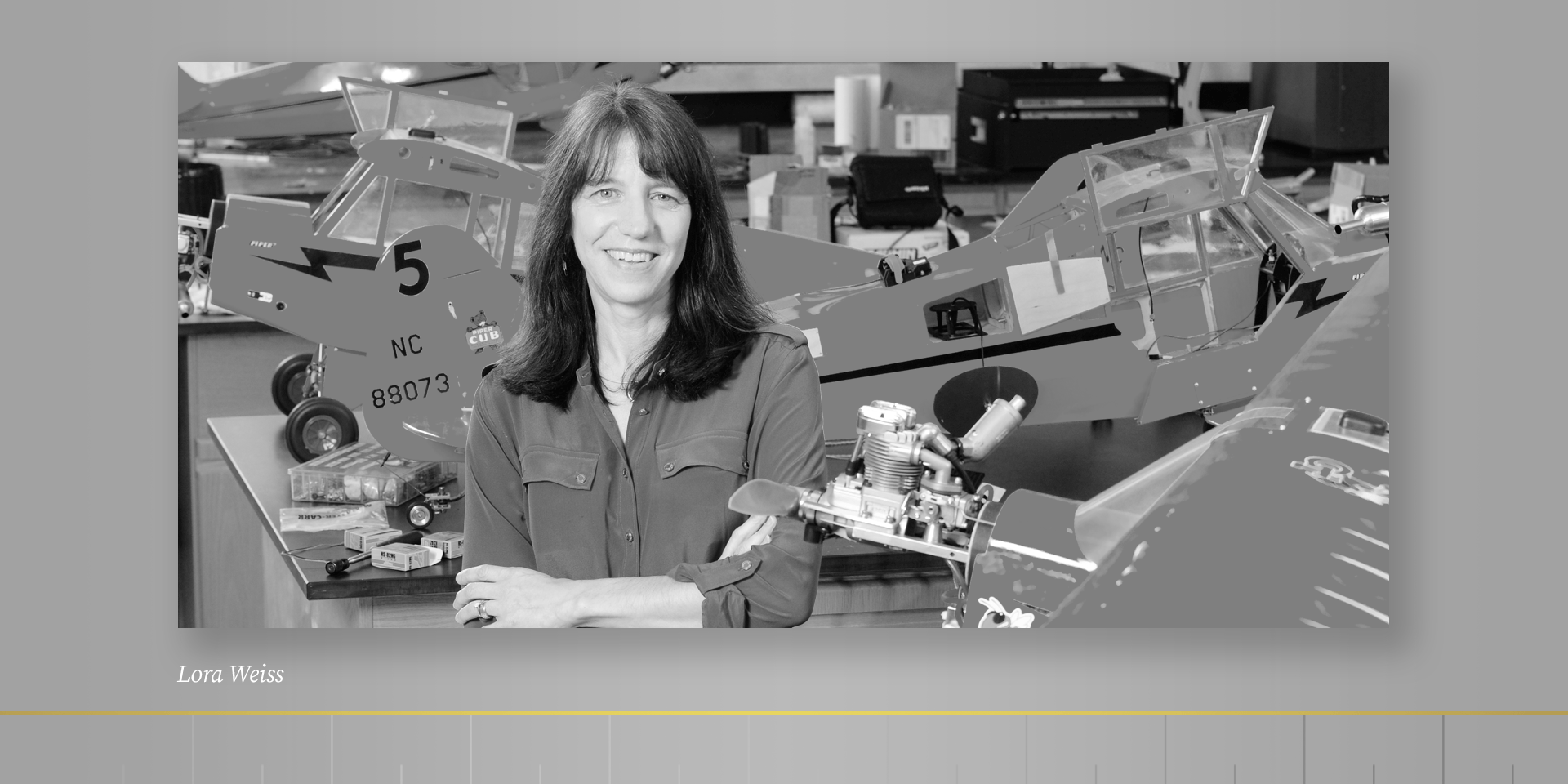
Throughout her career, Lora Weiss has worked on unmanned vehicles spanning the domains of undersea, ground, and air.
And the Director of GTRI
Since her arrival in 2006 as a faculty leader, Lora Weiss, Ph. D., now interim senior vice president of Georgia Institute of Technology (Georgia Tech) and director of GTRI, has not only watched GTRI expand, but she is a driving force for enacting and leading change. When Weiss arrived in 2006, she was charged with developing a research group in unmanned and autonomous systems. By June 2018, at the request of Georgia Tech’s president, Weiss agreed to serve as senior vice president of Georgia Tech and the director of GTRI, which meant leveraging her experience as Regents Researcher, deputy director, and chief technology officer of GTRI to propel the organization forward. As chief technology officer, Weiss was responsible for the portfolio of independent research and development investments. Now as the director, Weiss leads more than 2,300 people and nearly $500 million in applied research and development, primarily focused on advancing capabilities for the defense and intelligence communities. As a published researcher, her seminal paper was featured on the cover of the internationally renowned IEEE Signal Processing magazine in 1994 and again for a cover story in 2011 in IEEE Spectrum. In 2012, Weiss received Georgia’s Women in Technology Woman of the Year Award for Medium-Sized Businesses – an achievement that celebrates women who are actively engaged in Georgia’s science, technology, engineering, art, and math community. Under Weiss’ leadership and through a partnership with GTRI’s Diversity and Inclusion Division, the Women@GTRI series launched in 2018, inviting women from across the organization to meet, reconnect, and enjoy the comradery of those who are creating and supporting innovative advances across all dimensions of science, technology, research, and development. Weiss’ enthusiasm and expertise continue to push GTRI to its next pinnacle of innovative advances.
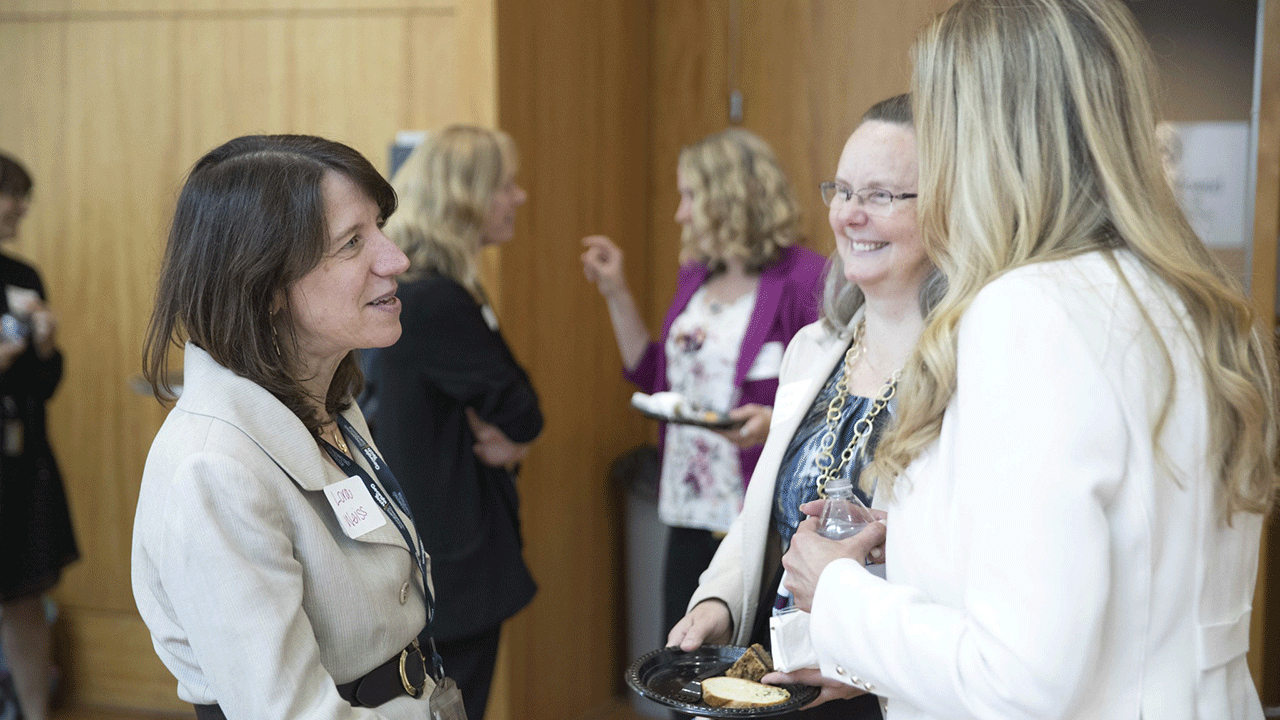
As director of GTRI, Weiss regularly engages with senior leaders within the government. She has provided testimonial to the Science and Technology Committee of the Georgia House of Representatives; she has provided presentations to House Armed Services Committee Staff, including the lead of the Seapower and Expeditionary Forces Subcommittee, and she has been Principal Investigator on DoD programs sponsored by organizations such as the Defense Advanced Research Projects Agency (DARPA) and the Office of Naval Research. Since assuming the role of director, she has already met with more than 30 senior leaders within the Department of Defense.
When asked what her advice was for other women working in technical fields, Weiss stated, “Constantly strive for technical excellence. Having technical mastery is indicative of one’s ability to think deeply, to think independently, and to solve challenges. This skill set transcends all disciplines and professions. No matter what career you select, a solid technical foundation is portable. It is what enables you to move within an organization and across organizations. By constantly expanding this technical foundation, you continually learn, giving yourself technical breadth as well as depth. Having this breadth will propel you upward; having this depth will give you credibility. Every company seeks such a talented individual.”
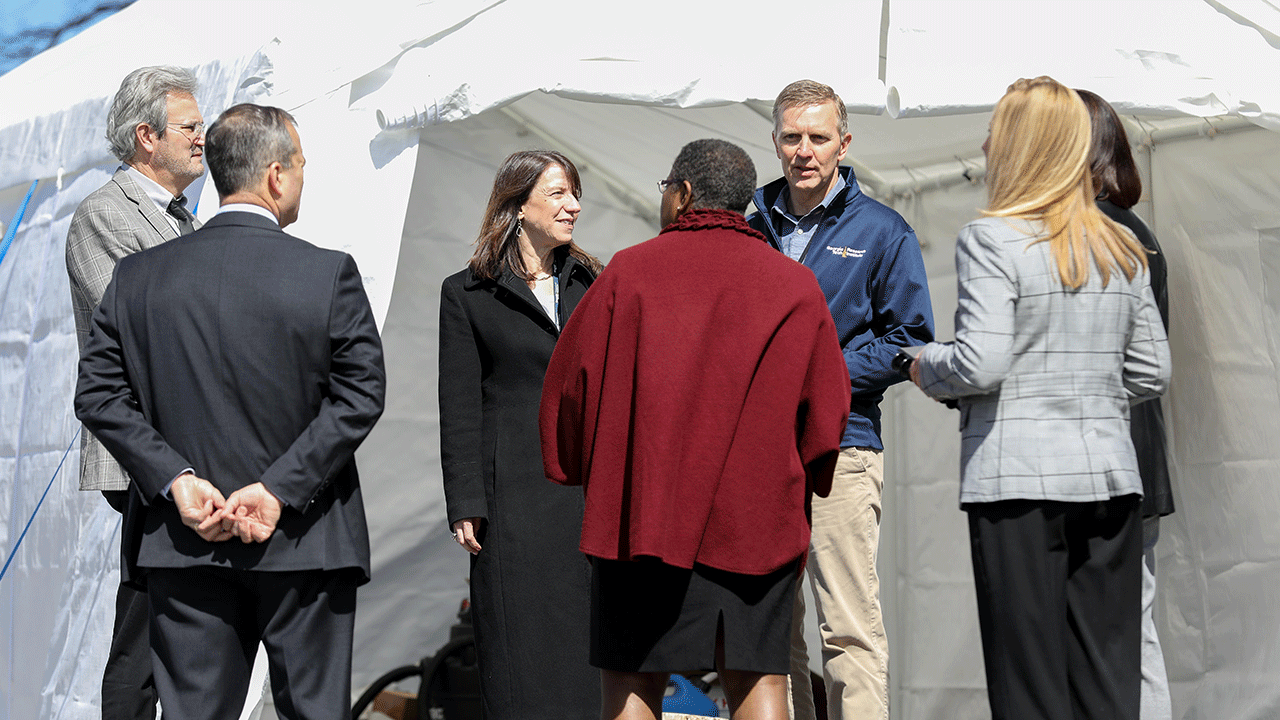
Combat Capabilities Development Command, Aviation and Missile Center.



